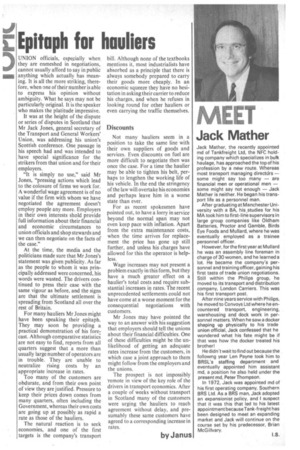Epitaph for hauliers
Page 44

If you've noticed an error in this article please click here to report it so we can fix it.
UNION officials, espe_cially when they are enmeshed in negotiations, cannot usually afford to say in public anything which actually has meaning. It is all the more striking, therefore, when one of their number is able to express his opinion without ambiguity. What he says may not be particularly original. It is the speaker who makes the platitude impressive.
It was at the height of the dispute or series of disputes in Scotland that Mr Jack Jones, general secretary of the Transport and General Workers' Union, was addressing his union's Scottish conference. One passage in his speech had and was intended to have special significance for the strikers from that union and for their employers.
"It is simply no use," said Mr Jones, "pressing actions which lead to the colosure of firms we work for. A wonderful wage agreement is of no value if the firm with whom we have negotiated the agreement doesn't employ people any more. Employers in their own interests shold provide full information about their financial and economic circumstances to union officials and shop stewards and we can then negotiate on the facts of the case."
At the time, the media and the politicians made sure that Mr Jones's statement was given publicity. As far as the people to whom it was principally addressed were concerned, his words were wasted. The drivers continued to press their case with the same vigour as before, and the signs are that the ultimate settlement is spreading from Scotland all over the rest of Britain.
For many hauliers Mr Jones might have been speaking their epitaph. They may soon be providing a practical demonstration of his fore: cast. Although comparative statistics are not easy to find, reports from all quarters suggest that a more than usually large number of operators are in trouble. They are unable to neutralize rising costs by an appropriate increase in rates.
Too many of the customers are obdurate, and from their own point of view they are justified. Pressure to keep their prices down comes from many quarters, often including the Government, whereas their own costs are going up at possibly as rapid a rate as those of the hauliers.
The natural reaction is to seek economies, and one of the first targets is the company's transport bill. Although none of the textbooks mentions it, most industrialists have absorbed as a principle that there is always somebody prepared to carry their goods more cheaply. In an economic squeeze they have no hesitation in asking their carrier to reduce his charges, and when he refuses in looking round for other hauliers or even carrying the traffic themselves.
Discounts
Not many hauliers seem in a position to take the same line with their own suppliers of goods and services. Even discounts on fuel are more difficult to negotiate then was once the case. For a time the haulier may be able to tighten his belt, perhaps to lengthen the working life of his vehicle. In the end the stringency of the law will overtake his economies and perhaps leave him in a worse state than ever.
For as recent spokesmen have pointed out, to have a lorry in service beyond the normal span may not even keep pace with inflation. Apart from the extra maintenance costs, when the time arrives for replacement the price has gone up still further, and unless his charges have allowed for this the operator is helpless.
Wage increases may not present a problem exactly in this form, but they have a much greater effect on a haulier's total costs and require substantial increases in rates. The recent unprecedented settlements could not have come at a worse moment for the consequential negotiations with customers.
Mr Jones may have pointed the way to an answer with his suggestion that employers should tell the unions about their financial difficulties. One of these difficulties might be the unlikelihood of getting an adequate rates increase from the customers, in which case a joint approach to them might follow from the employers and the unions.
The prospect is not impossibly remote in view of the key rote of the drivers in transport economics. After a couple of weeks without transport in Scotland many of the customers were urging the hauliers to reach agreement without delay, and presumably these same customers have agreed to a corresponding increase in rates.
by Janus




































































































